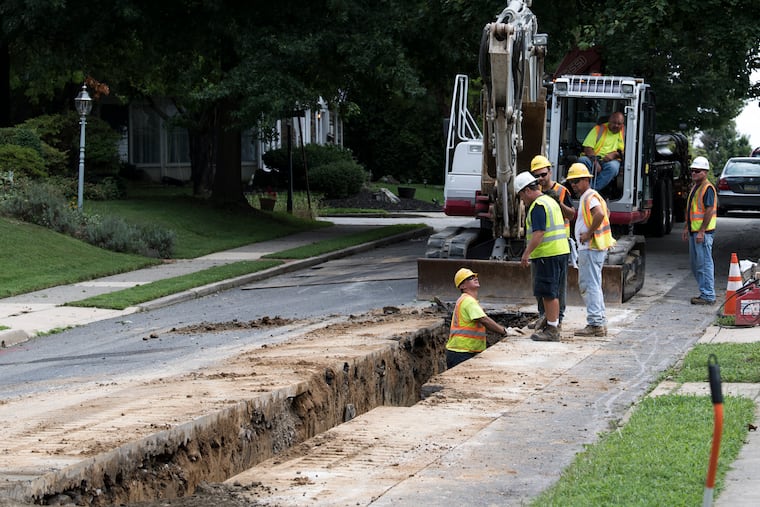Our water is becoming privatized. That’s a good thing. | Opinion
In Pennsylvania, systems operated by water companies are 37.4% less likely to have a drinking water quality violation than those operated by local governments.

Important conversations are happening in Pennsylvania about how to address water infrastructure challenges and needs. Unfortunately, the conversation is often focused solely on water rates.
Championing rates as the benchmark for affordability is shortsighted and shows a fundamental misunderstanding of the costs of providing safe, reliable water service at rates that are affordable. What good are low rates if they lead to crumbling, unreliable infrastructure and water that is unsafe to drink?
As president and CEO of the National Association of Water Companies, I know that our country’s water companies are working to establish “water equity” — a term that includes safety, reliability, and affordability of our water services.
The basic principles of water equity — meeting quality standards, offering customer assistance options, addressing flaws in our water grid, and investing in infrastructure — will move Pennsylvania closer to guaranteeing that everyone has access to safe, reliable water at affordable rates, no matter where they live.
Critics push the false narrative that water companies raise rates to pad profits. The reality is that Pennsylvania’s water companies do not set their own rates. Rather, rates are set by independent experts at the Pennsylvania Public Utility Commission (PUC) based on a thorough analysis of system needs. This includes looking at safety metrics, quality-of-service benchmarks, and the utility’s operating costs.
Too often, local politicians focus only on the next election. As a former chair of the PUC, I know that this model of rate regulation serves water equity by removing politics from the rate-making process, putting it in the hands of independent utility experts who are focused on long-term consumer and infrastructure needs.
Notably, Environmental Protection Agency water quality data confirm that this regulated rate-setting process works. In Pennsylvania, systems operated by water companies are 37.4% less likely to have a drinking water quality violation than those operated by local governments.
The PUC regulates the rates and service of just around 150 of the state’s water and wastewater providers. There are over 1,900 water systems in Pennsylvania compared with 21 electric utilities. Over 92% of those systems serve fewer than 10,000 people while 57% serve fewer than 500 people.
Without economies of scale, many small systems are often unable to invest in infrastructure, deploy new technologies, or address affordability issues. Pennsylvania’s investor-owned water companies invest more than $800 million annually to ensure safe drinking water, protect our environment, and preserve our most valuable resource.
Critical water infrastructure repairs and upgrades aren’t cheap, but those investments are necessary.
The EPA estimates that Pennsylvania needs to spend more than $16 billion over the next 20 years just to modernize its drinking water infrastructure. Old and leaky infrastructure results in the loss of six million gallons of water each day across the United States. Improved infrastructure results in fewer water main breaks and less wasted water.
» READ MORE: Big water companies are gobbling up public water systems | Opinion
Indefinitely deferring the work needed to protect water and wastewater systems solves nothing. In fact, it does something far worse: perpetuating the cycle of underinvestment, failing infrastructure, and poor water quality that disproportionately impacts communities of color and rural Pennsylvanians.
This cycle must stop. We cannot keep blindly celebrating low rates and ignoring bad results for customers. We must do what is required to provide reliable service and safe drinking water to all.
“Critical water infrastructure repairs and upgrades aren’t cheap, but those investments are necessary.”
Pennsylvania’s water companies invest in their customers by establishing customer assistance programs that support low-income households in paying utility bills. Water companies in our state also advocate for permanent federal funding for low-income assistance programs and have implemented water conservation programs designed to help consumers save money by reducing water usage. The goal is to ensure that customers of all income levels have access to high-quality water.
The men and women who work for Pennsylvania’s water companies are our friends and neighbors. They are a part of their local communities, and they are personally invested in ensuring that the water is safe when we turn on our taps. Private water companies are leading the way on water equity — doing what is necessary to provide high-quality service while, at the same time, designing rate structures and assistance programs to help those who need it.
Those who advocate blindly for low water rates are ignoring critical pieces of the water service story. We should shift the narrative away from a myopic focus on rates and instead adopt a more holistic view on water equity.
Robert F. Powelson is the president and CEO of the National Association of Water Companies (NAWC). Powelson previously served on the Federal Energy Regulatory Commission and the Pennsylvania Public Utility Commission.